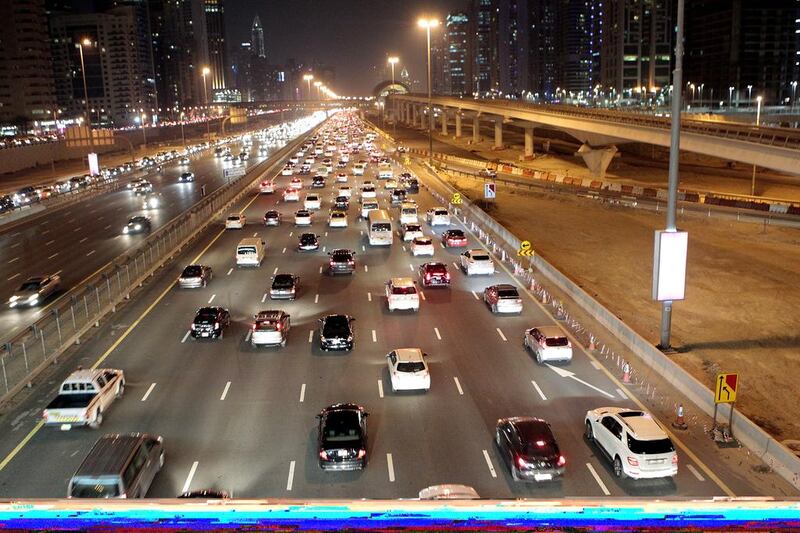ABU DHABI // Despite significant investments in infrastructure, more than half of motorists in a survey say driving in the UAE is now more dangerous that it was six months ago.
Fifty-three per cent of 1,000 residents polled said the country’s roads have become more hazardous. In Sharjah, 61 per cent said driving has become more risky.
Two-thirds of respondents said they have seen more speeding vehicles on the roads. Sixty-five per cent reported an increase in tailgating, and 75 per cent reported seeing a rise in distracted driving in the period.
Sixty-five per cent said road infrastructure has improved, according to a Zurich Road Safety UAE Driving Dashboard launched yesterday.
The dashboard is based on five key checkpoints: safety, collisions, traffic, fines and enjoyment. “The UAE government is committed to provide a word-class road infrastructure,” said Thomas Edelmann, founder of Road Safety UAE.
“However, respondents have expressed a rising concern for safety on our roads, with data points showing the main types of misbehaviour such as tailgating, speeding and distracted driving.”
Salaheddine Bendak, an associate professor at the University of Sharjah, agreed.
“Based on the United Nations, World Health Organisation and research studies I’ve conducted, infrastructure in the UAE is, comparatively speaking, very good. But some of the road users are either ignorant about basic road safety principles, or have an aggressive driving attitude,” he said.
One in five drivers admitted they had been in a collision in the past six months, with men (22 per cent) more likely than women (16 per cent) to have been involved.
Drivers in their mid to late 20s were the most likely to have had a collision (26 per cent), followed by those aged over 40 (20 per cent) and younger drivers aged 18 to 24 (20 per cent).
Commuters in Sharjah (73 per cent) and Dubai (66 per cent) said they experienced an increase in their travel time, compared with 57 per cent in Abu Dhabi.
Twenty-five per cent of Abu Dhabi drivers have experienced a reduction in their journey time, with 14 per cent in Dubai and 10 per cent in Sharjah reporting the same.
More than a quarter of drivers surveyed received a speeding or traffic violation fine in the past six months, with men (28 per cent) more likely than women (20 per cent) to have received a ticket. Drivers in their mid-to-late 20s were the most likely to receive citations (32 per cent).
Forty-one per cent of respondents said they enjoyed driving more than they did six months ago. Drivers in Abu Dhabi are significantly happier, with 50 per cent reporting an increase in their driving enjoyment compared with 39 per cent in Dubai and 32 per cent in Sharjah.
YouGov conducted the study for Zurich Insurance Middle East and RoadSafety UAE to quantify perceptions of driving in the UAE.
“This continuing bi-annual study will generate data and insights to encourage a culture of safe and responsible motoring, while supporting the goal of UAE Vision 2021 to catapult the Emirates into the world’s top five safest countries to drive,” said Brian Reilly, the chief executive of Zurich Insurance Middle East.
The study will be repeated every six months, with the next release at the end of the year.
“The main perceptions identified by the survey participants – speed, tailgating, driver distraction – are perennial problems,” said Dino Kalivas, the chairman of driver education at the International Road Federation.
“These issues need to be constantly at the forefront of education, in mainstream and social media, improving the standards and curriculum of driving schools and publicity campaigns highlighting the need for drivers to better understand new road technology.”
rruiz@thenational.ae






